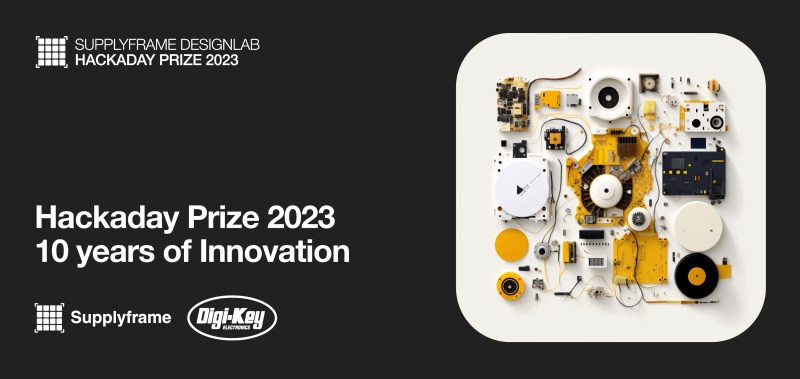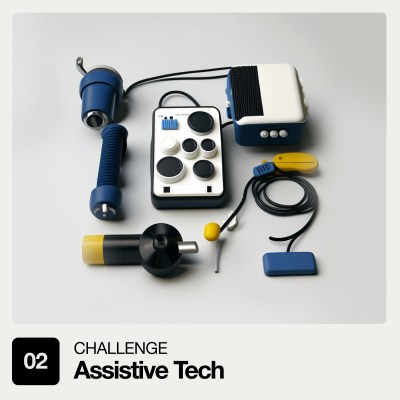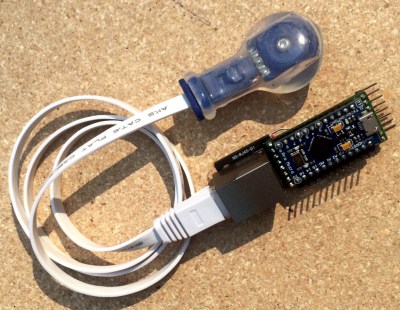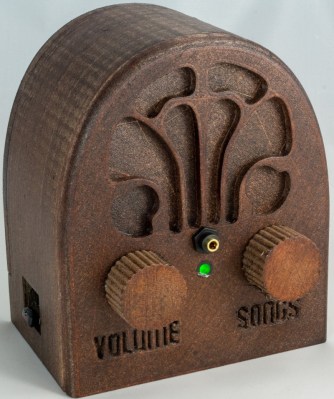
We’d all love to change the world and make it a better place, but let’s be honest…that’s a pretty tall order. Even the best of ideas, implemented perfectly, can only do so much globally. But that doesn’t mean the individual can’t make a difference — you just need to think on a different scale. If improving everyone’s life is a bit out of reach, why not settle for a smaller group? Or perhaps even just one person?
 That’s precisely what we’re looking for in the Assistive Tech Challenge of the 2023 Hackaday Prize. In this Challenge, we’re asking the community to come up with ideas to help those with disabilities live fuller and more comfortable lives.
That’s precisely what we’re looking for in the Assistive Tech Challenge of the 2023 Hackaday Prize. In this Challenge, we’re asking the community to come up with ideas to help those with disabilities live fuller and more comfortable lives.
Whether you help develop an improved prosthesis that could benefit thousands, or design a bespoke communication device that gives a voice to just a single individual, it’s hard to imagine a more noble way to put your skills and knowledge to use.
Looking to lend a hand? You’ve got from now until May 30th to enter your Assistive Tech project. It doesn’t matter what kind of impairment it focuses on — so long as it helps somebody work, learn, or play, it’s fair game to us.
The ten finalists for this Challenge will be announced around June 12th, but you’ll have to wait until Hackaday Supercon in November to find out which projects take home their share of the more than $100,000 in cash prizes graciously provided by sponsors Digi-Key and SupplyFrame.
A History of Helpful Hacks
In 2023 we’re celebrating ten years of the Hackaday Prize, and in many of those past competitions, we’ve included some challenge or special consideration for assistive tech. If you’re looking for a way to enrich your time on this this planet, helping those in need is a pretty good way to go about it, and we’re proud to help facilitate that sort of kindly hacking anytime we can.

During the 2020 Hackaday Prize, the BYTE hands-free interface was awarded the Grand Prize of $50,000 USD. The low-cost gadget allowed the user to control an electronic device, in its most common configuration a computer, by moving their tongue and biting down to make a selection. It’s essentially a mouse you manipulate with your mouth, with the added benefit of having a vibration motor for haptic feedback and sensitive enough components that various functions could be performed based on the strength of the bite.
At the most basic level, BYTE would allow those with limited limb mobility to operate a standard computer by emulating a standard USB human-interface device (HID) — no expensive software or proprietary hardware interface required. But the potential applications for the technology are vast. With only minimal adjustments, it’s not hard to imagine BYTE being used to control a motorized wheelchair or smart home.
 If you’re still short on inspiration, we can turn the clock back to 2017 and look at the finalists of that year’s Assistive Technologies challenge. These twenty projects tackled a wide-range of ailments, from helping the blind orient themselves within a space with an array of haptic feedback distance sensors, to an open source wheelchair design that could be built anywhere in the world using common materials.
If you’re still short on inspiration, we can turn the clock back to 2017 and look at the finalists of that year’s Assistive Technologies challenge. These twenty projects tackled a wide-range of ailments, from helping the blind orient themselves within a space with an array of haptic feedback distance sensors, to an open source wheelchair design that could be built anywhere in the world using common materials.
Such ambitious projects are of course noteworthy, but this batch of winners also includes entries which show the need for more personal solutions. Take for example the digital music player that disguises itself as 1940s technology, allowing older dementia patients to enjoy the simple pleasure of listening to their favorite songs. Or the camera-based system that lets users control a television just by moving their head.
These projects may seem trivial to those of us fortunate enough not to need them, but for those that do, these devices can mean regaining a piece of independence they may have thought was lost forever.
Reach Out and Help Someone
Ready to change somebody’s life for the better? You’ve got a little more than a month to enter your project into the Assistive Tech Challenge, where it could end up being one of the 10 Finalists that take home $500. From there, who knows? Your project might just make it into the Top 5, and enter the annals of Hackaday Prize history.
2023 Hackaday Prize: The Assistive Tech Challenge Starts Now
Source: Manila Flash Report


0 Comments